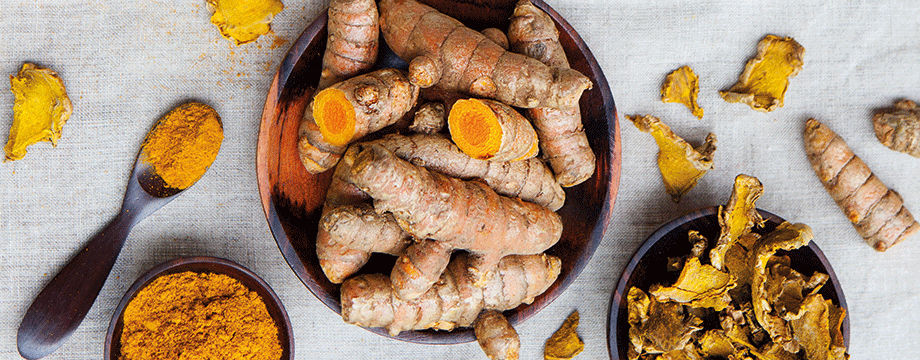Spotlight on: turmeric

Dr Hazel Wallace takes a look at the health benefits of this much talked about spice
Turmeric is the most talked about spice at the moment. It seems to be everywhere, and it seems that everyone is eating it or drinking it in their “golden milk” (i.e. a latte made with milk and turmeric). There are some pretty big claims to say it can fend off anything from cancer to Alzheimer’s disease. So, let’s take a deep dive into the claims and see what the science actually says.
First up, what is turmeric?
Turmeric is a yellow-coloured spice widely used in Indian and South East Asian cuisine and has played an important role in Ayurvedic medicine for many years. Most of us know it best as a bright yellow powder sold in packets or jars, or in a curry – it is often what gives it that awesome golden glow!
The health benefits of turmeric are believed to be due to one plant chemical in particular: curcumin. This chemical exhibits powerful anti-inflammatory and antioxidant effects that may be protective against certain forms of cancer and inflammatory diseases, such as arthritis and Alzheimer’s.
Anti-inflammation
Inflammation is a natural response in the body to something which it perceives to be harmful such as a type of bacteria, injury and even pollen. This process may be unpleasant as it brings about swelling, redness and often pain, but in the short term it is actually a good thing as it is helping us heal. However, if we are chronically inflamed (i.e. over months or years), due to some form of stress, our body constantly feels under threat and remains in a constant state of inflammation. It is believed that this low-grade inflammation over years and years can potentially drive the development and progression of several diseases such as arthritis, type 2 diabetes, heart disease and cancer.
There are a number of markers of inflammation, two of which are called TNF-α and NF-кb. They have an important role in our immune system but if they are activated wrongly, for example by a mutated gene, this can lead to the development of various diseases including inflammatory diseases, such as rheumatoid arthritis or inflammatory bowel disease.
Many drugs have been developed to block the action of these inflammatory signals and dampen down the inflammatory response. These drugs are very effective but tend to be extremely expensive, and usually with unpleasant side effects. As there is some evidence to suggest that curcumin can produce similar effects, it has become an attractive area of interest as a potential option for the treatment of a number of diseases. However, we can’t be certain whether blocking these particular signals will produce meaningful clinical improvements in real life – although it is certainly interesting.
Anti-cancer
Curcumin has also been investigated as a preventative and therapeutic treatment for cancer, largely because of its known ability to block these inflammatory signals which are also involved in cancer progression. And while there have been some promising results, most of the research is test-tube or animal experiments, and currently there is little evidence to show that curcumin can prevent or treat cancer in humans.
Osteoarthritis
The most robust evidence for the use of curcumin for medicinal purposes is in the treatment of arthritis. A large study, pooling together many studies, investigated the effects of turmeric and curcumin supplements on pain relief in patients with arthritis. They found that 8-12 weeks of 1,000mg/day of curcumin reduced symptoms of arthritis, and that curcumin was as effective as NSAIDs (non-steroidal anti-inflammatory drugs) such as ibuprofen. Although we don’t have enough evidence to make definitive claims yet, this is still food for thought.
Bioavailability
It doesn’t appear to be just as simple as sprinkling a little turmeric in your curry, as despite curcumin’s impressive properties on paper, it has one big drawback in that it has poor bioavailability (i.e. the amount we can absorb and actually use). This means you have to consume quite a bit to actually reach a therapeutic dose.
Most studies looking at curcumin use high dose supplements in various formulations to improve how easily absorbed it is, which means the end result is unlikely to be equivalent to the turmeric we buy in the supermarket. To add to that, a review of 28 turmeric and curry powders found only very small amounts of curcumin in the powders, with a maximum of 3.14 per cent in pure turmeric powder. However certain foods can help boost absorption such as black pepper (due to a compound called piperine) and fat.
If you enjoy the taste of turmeric then add it to your curry or your latte. I also quite like it sprinkled on cauliflower before roasting in the oven!
Dr Hazel Wallace is the founder of The Food Medic (thefoodmedic.co.uk). She is a qualified medical doctor, best-selling author, content creator and health influencer. Her latest book, The Food Medic For Life, is out now.
Read more Your Food articles here...
Read articles from our latest issue here...